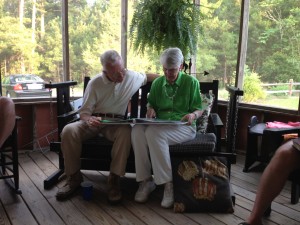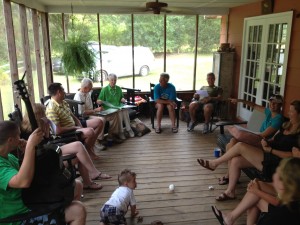Search for topics or resources
Enter your search below and hit enter or click the search icon.

“The greatest political storm flutters only a fringe of humanity. But an ordinary man and an ordinary woman and their ordinary children literally alter the destiny of nations.” –G. K. Chesterton
I’ve recently returned from celebrating my wife’ s grandparent’s 6oth wedding anniversary. Their marriage has been a picture of permanence, exclusivity, and joy.
s grandparent’s 6oth wedding anniversary. Their marriage has been a picture of permanence, exclusivity, and joy.
My Granny and Gramps have three children, of which two are married. In total, they have four grandchildren. Three of the four grandchildren are now married. Two of the grandchildren have children of their own, thus making Granny and Gramps great-grandparents. From two persons, their marriage has resulted in no less than five marriages. The marriage of Granny and Gramps has, in the words of G.K. Chesterton, “altered the destiny of nations” because theirs is a union that results in a good that will outlast the marital relationship itself. The “good” I speak of, of course, is the stabilization and continuation of civil society. Society is little more than the mass aggregate that results from two persons duplicating conjugal relationships over and over.
As we sat around for a time of family worship on Sunday evening, it struck me that what I was witnessing was not merely a time of worship, but also a manifestation of the “common good.” I looked around and saw not only a group of atomized individuals, but a large family, and smaller groupings of separate families. One initial family spawned more families. And so on. It’s in this “common good” that I find the greatest apologetic for traditional marriage: The stability offered by the marriage of Granny and Gramps has resulted in marriages that, because of the model presented to their children during childhood, are themselves stable and mirroring the ideals of permanence, exclusivity, and the production of children. Stable marriages produce, typically, stable children. Stable children grow to participate in more stable societies. This is what we call human flourishing. It’s neither abstract nor difficult to embody. It’s as simple as what results from two individuals who loved each other and understood that the well being of their children mattered more than self-fulfillment.
So what’s the point?
Government has a compelling interest in promoting, protecting, incentivizing and validating relationships like that of Granny and Gramp’s because relationships like theirs secures the continuation and well being of the body politic. The United States government is dependent upon Granny and Gramps, not the other way around. 
If individuals reproduced asexually, marriage as an institution would not exist. People could collaborate, but there would be no innate incentive to restrict relationships around the concepts of permanence and exclusivity since the relationship lacks any form of permanent attachment or produced “good” between the two peoples. Marriage exists because the sexual union between two persons can (and often does) produce children. Children need protected and the resultant child forms a necessary attachment between the individuals involved in a conjugal act.
Up to this point, I haven’t mentioned same-sex marriage, and I regret that I have to. I tire of the debate. You could have read this without same-sex marriage ever crossing through your frontal lobes. But I must mention it because the attempt to redefine the essence of marriage is a subtle, yet pernicious distortion about reality. My goal has been, instead, to highlight the essence of marriage that cannot be mimicked apart from sexual complementarity: The production and rearing of children.
The marriage debates often take on highly philosophical arguments. It doesn’t have to be so. On a Sunday evening in mid-June, an act of marriage demonstrated a societal good. Thirteen people, I realized, owed either their lives or their marital bond to an act that occurred sixty years ago and which continues to occur up to present day. Same-sex couples cannot—by their very essence—recreate what I encountered on Sunday night. Same-sex couples can practice permanence and exclusivity, but they cannot by any biological act produce children. Same-sex couples are by definition childless. If marriage is a societal act that promises the continuation of society, any arrangement or sexual relationship that is childless cannot be societal in a foundational way.
I don’t want to devolve this essay into why same-sex unions are inferior to traditional marriage. It’s not, I’d argue, that same-sex couples are inferior to opposite-sex couples in feelings or devotion. It’s that government has no compelling interest to oversee or protect relationships that do not outlast the relationship itself. Same-sex couples exist in a relational vacuum that cannot, by definition, perpetuate its existence. None of this is written to suggest that same-sex couples ought not to have the right to be together nor live together, nor be happy. It’s to suggest that the same-sex relationship cannot ever be an actual marriage. For if Chesterton is right, same-sex relationships produce no nations to alter.
